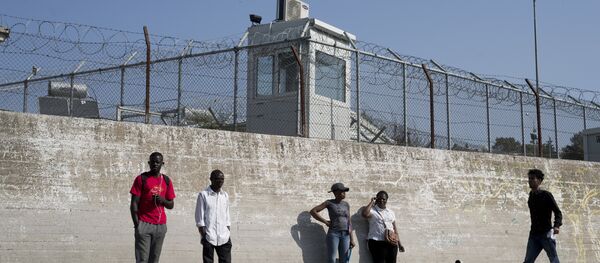Under the EU's Dublin Regulation, asylum seekers must lodge their claim in the first EU country they set foot in. That country becomes responsible for providing protection and processing the application. The court's decision means that Germany will be able to return asylum seekers to the country in which they entered the bloc. According to Deutsche Welle, last year Germany transferred more than 8,000 applicants to other European states. Hungary accepted none, while most went to Italy.
Sputnik has talked about the Luxembourg court ruling with Dr Danai Angeli, human rights lawyer and researcher, member of the Athens Bar Association. She specialises in asylum and migration and has published extensively on the topic.
Sputnik: My first question is why is the European Court coming up with this decision now? And how concerning is this news for Greece?
Dr Danai Angeli: Well, we cannot know exactly the mindset of the judges, but for sure the judgment comes at very good timing. Because there's currently quite some pressure with the EU on how to effectively and efficiently manage secondary asylum flows, and what I mean with this is asylum seekers or even persons who were granted international protection who are moving from one member state to another in search for better living conditions.
READ MORE: Sudanese Refugee Claims 'Immorality' in UK to Blame for His Sex Attack
And we see this in the current debate on how to reform the Dublin system to make it faster, more efficient. We also see it in the bilateral agreements that some members states strike, especially Germany, with other member states like Greece, Italy and so on to manage these flows even in a speedy way outside the Dublin system.
So with this background or within this context, this judgment in a way provides some guidelines to EU member states on how to control, let's say, their borders or how to manage those secondary asylum flows associated with living conditions within the Dublin system, while respecting European human rights standards. So in this sense, it's good timing for this judgment.
Sputnik: But how concerning is this news for Greece? What kind of impact could this have on relations between Athens and Brussels?
Dr Danai Angeli: Personally, I don't quite agree with a reading of the judgment that says now Germany can simply just send all asylum seekers back to any of the EU member state independent of the social living conditions. The judgment for sure says that poor living conditions are not a block to a return, but it also says that extreme poverty will block a return of an asylum seeker from one member state to another.
And if we take into account the situation on the ground in Greece and if we also take into account the profile of the people who are the majority of the asylum seekers right now in Europe, especially after the Syrian crisis, I don't necessarily see suddenly a huge return or a massive of return of asylum seekers from member states in Northern Europe towards the South.
READ MORE: Berlin is Eligible to Deport Refugees to Poor EU Countries — ECJ
I think the judgment for sure says it's fine to return a person to a country where there will be poorer living conditions, but it's not fine to return him to a country where he'll be extremely poor, and it says you always need to assess individually each case. So I wouldn't expect a mass return, to be honest.
READ MORE: First Migrant Jailed for Raping Girl Under 10 Amid GROOMING Spree in Finland
Sputnik: How sufficient are Greece's capabilities to host a certain amount of refugees if they're sent to Greece?
Dr Danai Angeli: Well, that's exactly my point. I think right now the situation on the ground in Greece has improved compared to maybe 10 years ago, but for sure in many aspects, it does meet this threshold of inhumane and degrading treatment that the judgment talks about. Still, the judgment tells us that you cannot return a person to a country where he will not have access to water, to shelter, to personal heating. And in fact, for many, many asylum seekers this is the reality in Greece.
I think the latest statistics say that one out of three unaccompanied children in Greece does not have a secure accommodation at least, which means he lives on the street or informally with a relative, or is under protective custody. So if we have this in mind with the most vulnerable category you can imagine what happens with the rest of the asylum seekers who are living in Greece. We still are far from securing for asylum seekers living conditions which might be poorer, but still, meet at a threshold of human treatment.
Sputnik: Now the court argues that deportations are justified under the "mutual trust principal", could you explain to what extent are the interests of other EU countries taken into account here?
Dr Danai Angeli: Well, the judgment for sure is trying to balance different political interests. For sure member states have their own interest, at least the way I see it, of managing their borders, of controlling their borders, and for sure the starting line that you can return an asylum seeker to a country with poor living conditions, for sure reflects the interest of states that offers a tool for secondary flows; but there are also some limitation to this.
And I think there we also see the reflection of the other member states that often have the biggest share of accommodating asylum seekers where it says the conditions are so poor you simply can't send this person back, always asks for an individualised assessment and it distinguishes vulnerable groups. So it depends on how you read the judgment.
READ MORE: 'Not Beneficial': Think Tank Puts Huge Price Tag on Iraqi, Somali Migrants
The way I read the judgment I don't see it only as a one-sided reading. I see an effort to balance interests in that quite politically sensitive environment. And for sure will see a wider conflict between the EU policy to manage its borders and the EU human rights standards it has pledged about the prohibition of inhumane and degrading treatment and protection of human dignity and so on. How it will play out in practice will really depend on the domestic policy.
The views and opinions expressed by the speaker do not necessarily reflect those of Sputnik.






